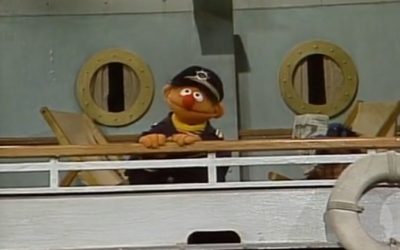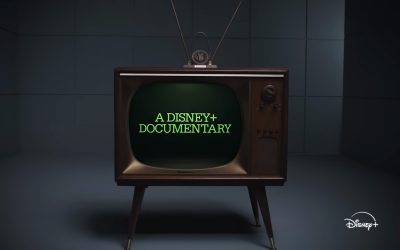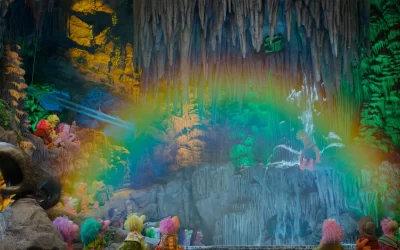This is part three of a three-part interview. Click here to read part one, and click here to read part two. Read on for part three, in which Mark Saltzman talks about Ernie and Bert, unexpected media controversy, and the psychology of Snuffy and Telly!
[Note: This interview was conducted over the course of two conversations and has been edited for clarity.]
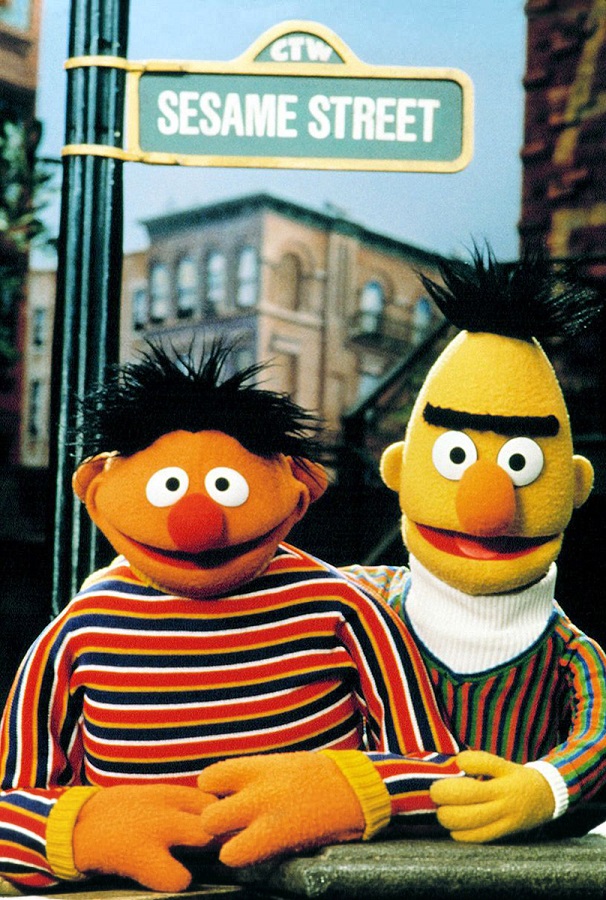
TP: You did an interview a while back with the online magazine Queerty. You made a comment about writing for Bert and Ernie and how they reflected your own relationship, and the magazine kind of zeroed in on that one part of your interview and made that the focus of the whole piece.
MS: Yeah, that’s pretty accurate. The interview in Queerty was about New York in the ‘80s – here I was writing for this zippy, peppy, happy children’s show, and pleased as all get out to be doing it… and meantime, outside the door, the AIDS epidemic was raging. That was really the focus of the original interview: What was that like? Those of us who survived want to keep that story alive. New York was an epicenter at that time.
And I knew the Queerty interviewer – he wasn’t playing “gotcha” or anything like that, but he asked the question a gay publication would ask: “What about Bert and Ernie?” My answer was a kind of evasion, as I recall, because there’s nothing to say. What I did say was that my late partner and I were a kind of Bert and Ernie couple. Arnie – Arnold Glassman — was a Bert type.
TP: So you were the Ernie?
MS: I was the Ernie, yeah. I was the cut-up. I was the comedian. He was pretty stern and extremely organized like Bert, as a film editor has to be. It was one of those things where I always thought, if Bert had a career outside that apartment, a film editor would be perfect. Ernie would have to be a performer.
TP: Right.
MS: But even though Arnie looked more like Ernie and I looked more like Bert, everyone knew who we were. And of course, our names were Mark and Arnie, so once I started on Sesame Street that was it.
TP: Everyone made that comparison?
MS: Oh, sure. Arnie got called “Ernie.” One of our friends had a way of saying Arnie’s name… It was like “Aernie.” So to me, I was telling a delightful, sentimental, warm anecdote about using my personal life when writing Bert and Ernie. But TMZ got ahold of that, and you know, they do whatever they want. They made it a headline: “Sesame Street writer admits Bert and Ernie are gay.” I remember looking at that and thinking, “Oh, that’s just stupid,” but then it just kept popping up!
TP: Oh yeah, it was huge.
MS: Yeah, huge! I’m sitting here in my little office in Studio City watching this happen, and watching requests for interviews come in. TV interviews! I’ll never forget, this was during the Kavanaugh hearings, and this was such a moment in history, especially for women’s rights – it’s just one more moment during the Trump administration that the world is collapsing. I’m so focused on this, and these people are calling me. I’m saying, “You should be covering Kavanaugh!”
TP: Instead of talking about these Muppets.
MS: Yes, about Bert and Ernie’s sex life! [Laughs] It did keep going around, and I felt obligated to talk to the gay publications that called, but I didn’t want to spend my life on this.
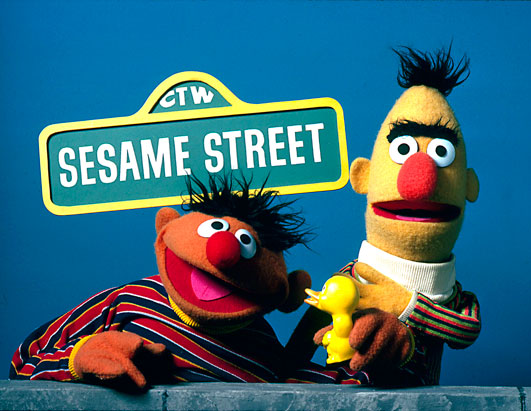
TP: I saw a few follow-up interviews with you. Did you end up doing any TV interviews?
MS: No, that was carrying it too far. I’m also too lazy to get in a car and drive all the way to Culver City or wherever it is. In Los Angeles, everything you’re invited to do, your first thought is on the traffic: “How long will it take to get there? What route will I take?”
TP: When this happened, Sesame Workshop released a statement on social media, and then later they released another, vaguer statement.
MS: Right. Their first statement was written, I think, the last time around. And what had happened since then was Twitter, so this time, all of gay activism and all the allies – which is pretty much everyone under 40 – just rose up on Twitter. Then poor Frank Oz tries to get into the mix and makes it worse.
TP: There was sort of an arc there, where he initially tweeted “Of course they’re not gay,” and then as people were responding to him, his comments were to the effect of “Oh, I never realized how important this was to people.”
MS: Yeah, I think he got some good advice. He learned and grew. I also did an interview with The New York Times because at the beginning of my career they were nice to me. [Laughs] That was the only mainstream media I talked to. That was a little more in-depth, and what I said there was that I don’t think Bert and Ernie should be portrayed as gay, because the ambiguity… The idea of two guys who are living together and have different personalities and bicker, that’s very useful for any kid who’s got a brother, who has to share a room. It’s a good way to say, “You might argue over where the line down the middle of the room is, but you can still love each other and still be friends.”
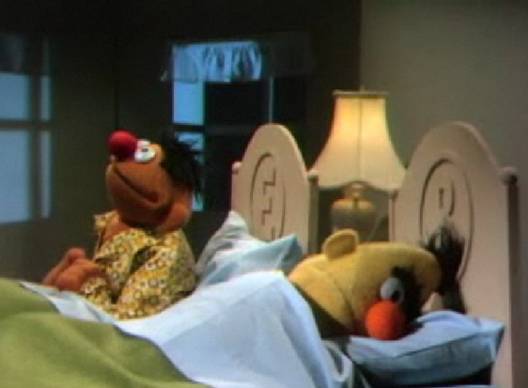
Sesame Street’s supposed to keep an eye on people in the poverty zone, where fostering is a big thing. If you’re a little boy and you’re fostered and you have to share a room – “See, it’s like Bert and Ernie!” Making them a gay couple, then they’re not all these other things. To Arnie and I – and as it turned out, to hundreds and hundreds of kids-now–adults who were watching this – Bert and Ernie were their secret role models. For gay kids, and even after being kids, they had Bert and Ernie in their head as a role model, because there were no other images.
Absolutely Sesame Street should have gay content – they should be teaching preschoolers that when you go to school, you’re going to meet new friends, and some are going to have one parent, some are going to have a mommy and daddy, some will have two daddies… Theyshould prepare them, just like you would for multi-racial [families]. I still can’t believe they haven’t. Here it is, 2020, and they still haven’t crossed that line.
TP: You think the way to do it would be with human characters?
MS: Yeah. To me, it was like the Roosevelt Franklin thing, which just surfaced again. Somebody just wrote a Sesame Street book and they covered that issue, which was a cultural artifact of racial representation. The point was, they had a black Muppet at the beginning, and it caused all kinds of trouble. If he spoke in Ebonics, the more educated black parents would object, and if he spoke in perfect English, you’d get “Oh, he’s ashamed he’s black.”
Because it was a Muppet. You wouldn’t throw that accusation against Gordon or Loretta Long [as Susan], because they’re just speaking the way they’re speaking. But a Muppet was a lightning rod, and I think it would be the same thing: “Oh, Bert’s a stereotype of the prissy queen.” [Laughs] Why open that up? They’re functioning so well.
The Times allowed me to talk in-depth, the way you’re allowing me, and I knew that was read by Sesame Street people too, because the head of production gave her final interview, and she said, “They’re gay if you want them to be gay.” It was a good paraphrase of what I had said in the Times.
TP: That was Brown Johnson, the vice president and creative director. Those words were kind of the perfect balance, I think.
MS: Anyway, in the greater cause, advancement was made, and it got to Frank Oz getting woke to gay issues, and Brown Johnson acknowledging that and saying the word “gay.” That word passing the lips of a Sesame Street executive, that was probably a first.
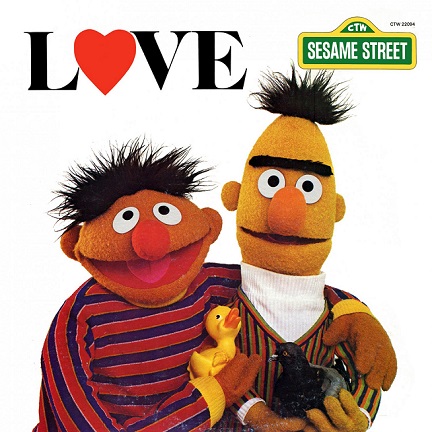
TP: And the people who were offended by that were the people who would have found something to be offended by anyway.
MS: Sometimes these “taboos” get so embedded that you can’t break them even if you want to. After 50 years of this taboo, I don’t think anyone there is doing any polls or research to see “If we put a gay character [on the show], what would the effect be?” “Oh, look, in the Bible Belt, in Mississippi, we lose this many viewers.” Although with HBO, you’re shooting up.
TP: You might think the move to HBO would give them a little more freedom that way.
MS: That’s why I say it’s more “a taboo” than any rational thinking. It’s just a case of “We’ve always done it this way, we might get letters.” But you know… tiny little steps. It happened this way with gay representation on network television. Except I think where [Sesame Street is], saying the word “gay” off the air to the press, that’s probably like network television in… 1972? When the first gay characters appeared. In children’s television, it’s going to be tiny steps.
And you are going to lose viewers. You are going to get hostile letters. I got plenty of hostile e-mails just from this! A couple of offers for dates… and a couple of sleazy offers we’ll just forget about. (Laughs) But all in all, when the dust cleared, I felt things were better. Also, I got a tiny moment to acknowledge my relationship with Arnie to the world. Anyone who knew us knew us, but now when you Google me, Arnie also comes up, so that’s great.
TP: Yeah, at the root of all that, it’s a nice, personal story.
MS: Yes, at the root of the whole thing was a kind of sentimental remembering. That’s what started the whole thing, and that really got lost. I had one person I knew at Sesame Street – I’ve lost touch with most of these people – one person wrote and said “I didn’t know. I’m sorry for your loss.” That was the correct response. But everything’s a tiny bit better because that happened. You can pretty much figure that old press release has been shredded. It’s in captivity now, it will not be released.
TP: I do have one more Sesame Street question, which is, did you have any favorite characters to write for, or were there any characters who were most challenging to write for?
MS: Big Bird was always challenging for me.
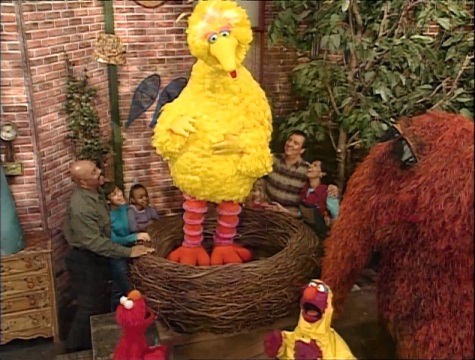
TP: We’ve actually heard that from other writers before. I wonder what it is about Big Bird.
MS: Well, one thing is he’s a goody-goody.
TP: Yeah, he’s so nice.
MS: And he’s reactive, generally. He’s inquisitive. People are doing things that he wants to know and have that thing explained. You kind of had to [write for him], because he was the surrogate child, so you had to use him, but for me, the ones I came up with were the ones closest to my heart, like Placido and Hoots the Owl. They were musical, and being a musician I like to write music stuff. I liked writing for Alaina – feeling so grateful for her, I always tried to do some top-notch material.
I liked Snuffy. Writing for Snuffy meant writing for Big Bird, but you know, he was depressed without any reason. “Weltschmerz,” do you know that phrase?
TP: I don’t think so!
MS: I think Freud uses it. It’s “world sorrow,” and it’s nothing psychoanalysis can fix. It’s just a state of being that the Germans and Eastern Europeans understand. It’s just a sense, like “I’m alive, and… doomed.” (Laughs) Writing for Snuffy, I always sort of felt that way. He had a friend, and there’s no reason for him to feel that way except for this awareness of how brief life is. Snuffy can’t shake that.
TP: He does kind of have that attitude, but I never really thought of Snuffy as being that deep.
MS: I did. (Laughs) My own depth was reflected.
Prairie Dawn was another one. I loved writing for her. In my head, I imagined her as Jack Benny, which was a major comedy show for me growing up. It’s brilliant if you watch old Jack Benny shows. There’s nothing quite like it. He puts himself in this surreal universe of these recurring, annoying, grating characters that just keep popping up and antagonizing him for no reason. He’s just an innocent going through life in this insane world.
Partly because of feminist politics, Prairie couldn’t be like a Cookie Monster or Bert. There were no female Muppets, so [the few that existed] had to be good role models. To me, she was the eye of the storm. She was Mary Tyler Moore or Jack Benny — things were swirling around. For her to just try to impose some order on this absurd, chaotic world, I kind of related to that.
I enjoyed writing her. “The Triangle Is Right,” putting her on game shows, and having her trying… Oh, she was a musician too, now that I think of it. She played the piano in the pageants. She was a good director, trying to get through this pageant and get this show on, and it was always the pageant that went wrong, and yet she’d somehow prevail in some non-hostile way.
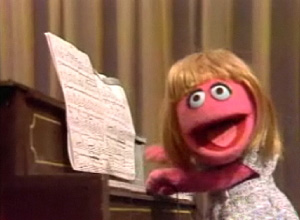
TP: She’s a little like Kermit that way in certain sketches, where she’s trying to make things happen while she’s surrounded by these wackier characters who are making things go wrong.
MS: Yes, that’s right. It was that Kermit “eye of the storm” [characteristic]. I wasn’t there when she was created, but I wonder if, as Jim’s presence decreased, they needed another kind of Kermitty character.
TP: That may be right, because at the beginning she was more of a generic little girl character.
MS: It’s all these kind of marginal characters, now that I think of it. For all the tempest that blew, I don’t hear myself saying “Bert and Ernie.” They were fun, but I think they were sticky in that I loved them for being Mark and Arnie, but as far as “in the heart of my heart” I think it was these marginalized [characters] – Snuffy and Prairie… and I think Hoots was mine. If not, I wrote for him a lot.
TP: I see on Muppet Wiki that you wrote a few episodes with Telly.
MS: He was an agonizer, and I think he reminded me of my mother. Everything’s a disaster, and everything’s agony, and it’s all going to go terribly, terribly wrong. I think that’s what drew me to him.
It’s funny, because as I’m rattling these off, it wasn’t the big stars. (Laughs) I wrote for the supporting characters.
TP: That’s interesting. Maybe they were more fun to write because they weren’t the big star characters.
MS: I think so. And when it’s “Who’d you write for?” people want to hear Big Bird and Bert and Ernie, but I like my little supporting people and want to keep them alive too.
TP: What are you working on now?
MS: I have two movies in play at the moment, so I’m very happy about that, even though it will be some time before film production recovers from Covid. One of them I can talk about. There’s a play of mine that’s been around called Mr. Shaw Goes to Hollywood, which is about the one time that George Bernard Shaw paid a visit to a movie studio, MGM. Of course he just destroys everything in his path.
It made a good play, and this indie film company here has optioned it, and I’m finishing up the screenplay right now, so that gets my juices going. It’ll be the first play of mine that’s optioned for a movie.
TP: Well, thank you very much for the time, and thank you for all the great Muppet stuff over the years.
MS: Thank you. Take care!
Thanks as always to Muppet Wiki for image and info help! Click here to drive all the way to Culver City on the Tough Pigs forum!
by Ryan Roe – Ryan@ToughPigs.com

